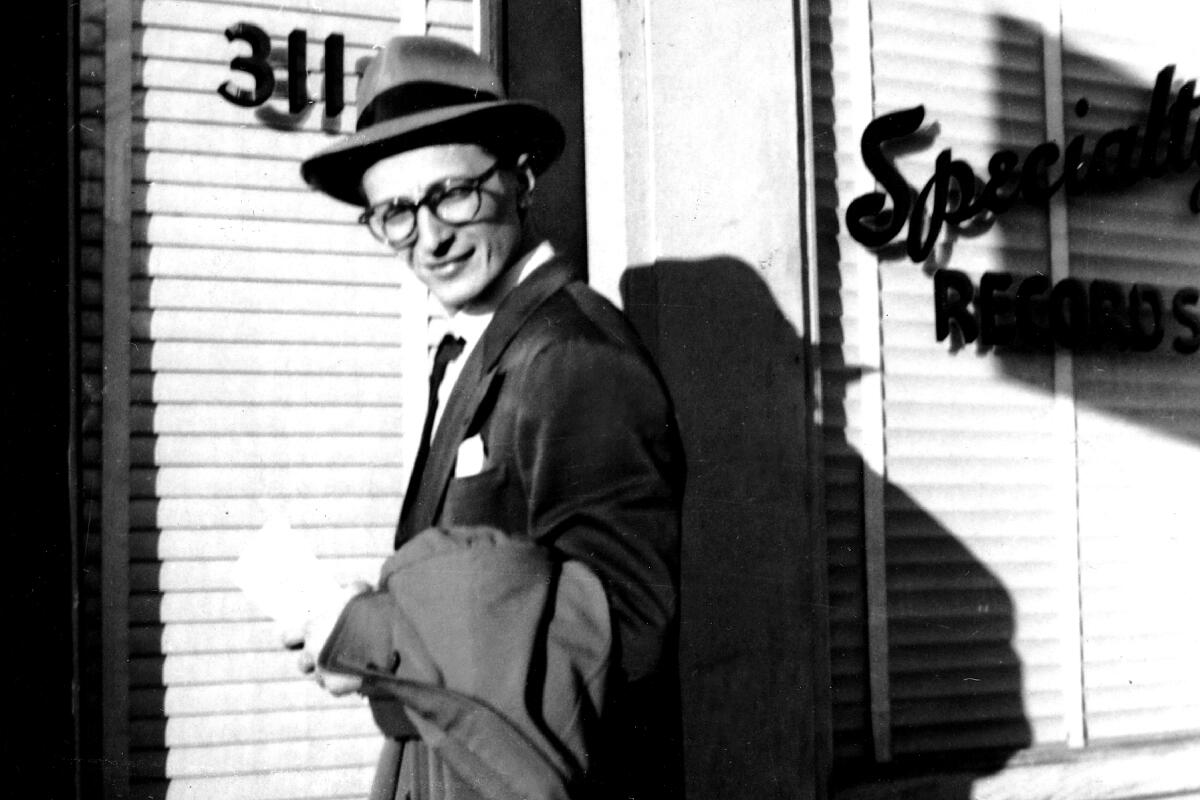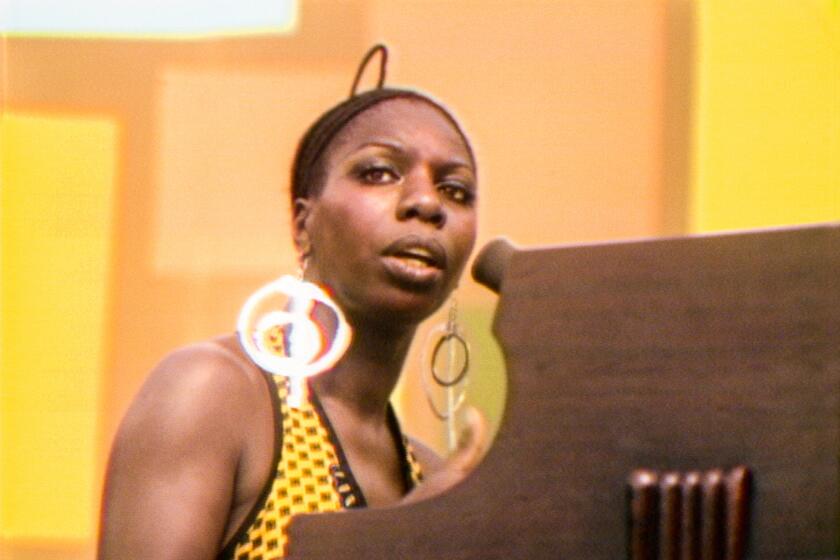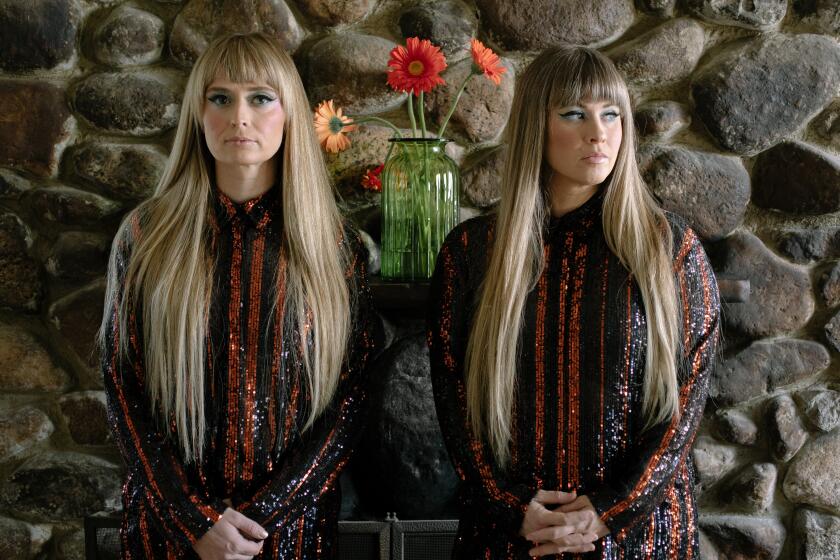Art Rupe, pioneering rock ‘n’ roll mogul who helped launch Little Richard, dies at 104

- Share via
Record man Art Rupe, who started a small Boyle Heights-based independent label called Specialty Records in 1946 and went on to help launch the careers of artists including Little Richard, Sam Cooke, Percy Mayfield and dozens of other jazz, blues, gospel, R&B and rock ‘n’ roll artists, died Friday. He was 104.
Rupe’s death at his home in Santa Barbara was announced in a statement by his family, which did not provide a cause.
The producer, businessman, philanthropist and Rock & Roll Hall of Fame member served as an essential amplifier of the vibrant post-World War II music scene along Central Avenue in South Los Angeles.
Specialty’s national success, starting in the late 1940s, helped establish the L.A. independent music industry, which before the war was dominated by New York labels with West Coast satellite offices. As Specialty (and eventual Hollywood neighbor Capitol Records) began banking genre hits by gospel, jazz and early R&B artists including the Pilgrim Travelers, Lloyd Price and Sister Rosetta Carr, Rupe scoured the country in search of Black artists with shock-of-the-new approaches to popular music.
As Rupe once described of his entrepreneurial approach, “I looked for an area neglected by the majors and in essence took the crumbs off the table of the record industry.”

Across 15 years, Rupe released sides by foundational American artists including John Lee Hooker, Lloyd Price, Clifton Chenier, Guitar Slim and the Five Blind Boys of Alabama. Most famously, Rupe signed a rising star named Little Richard and set the stage for Cooke, then a young L.A. gospel singer for the Soul Stirrers, to become a soul superstar.
By the time Rupe and Specialty stopped making new records in 1959, the brand had become a flagship label of the rock ‘n’ roll era.
“The name Art Rupe should be spoken with the same reverence as any of the giants: Sam Phillips, Ahmet Ertegun, Jerry Wexler, or Leonard Chess,” wrote Billy Vera, singer and author of the 2019 book “Rip It Up: The Specialty Records Story,” in the liner notes to a recent Specialty 75th anniversary release.
A driven businessman who loved the music while at the same time signing his artists to exploitative record deals — “Tutti Frutti” sold more than 500,000 copies but, at a royalty rate of a half-cent per record, reportedly netted Little Richard a mere $25,000 — Rupe harnessed the cultural upheaval that was rock ‘n’ roll to make household names of Specialty stars.
A revived Harlem cultural festival is returning in 2023 after the success of Questlove’s “Summer of Soul” documentary, which captured the 1969 event.
He was a meticulous businessman from day one. Rupe settled on Specialty’s eye-popping yellow labels after a marketing professor said that it was among the colors most likely to attract buyers’ attention. “I established a set of rules or principles which I felt would enable me to make commercial records,” he told author Peter Guralnick in “Dream Boogie: The Triumph of Sam Cooke,” adding that “some of the music moved me so much it brought tears to my eyes.”
Rupe once described making a hit record as “analogous to producing a play, with an introduction, development of a plot, even acts and a coda.”
Rupe was born Arthur Goldberg in Greensburg, Pa., on Sept. 5, 1917, and raised in nearby McKeesport. The son of an Austrian immigrant laborer and a stay-at-home mother, Rupe first heard Black gospel music on Sunday mornings, when he would sit outside a neighborhood Baptist church and listen to the soaring voices. “He fell in love with that soul and that feeling,” Vera said in a 2019 interview, adding that “before anybody was using the word ‘soul,’ [Rupe] called it soul.” Vera noted that Rupe was so attracted to show business that as a kid he worked in a carnival.
Graduating from high school in 1935, Rupe did stints at Virginia Polytechnic Institute and Miami University (Ohio) before moving west in 1939 to attend UCLA, ultimately graduating with a business degree. After Pearl Harbor, Rupe worked as a shipbuilding engineer on Terminal Island.
Originally gunning to succeed in the movie business but instead opting for the record industry, which had fewer barriers to entry, Rupe co-founded Jukebox Records in 1944. Famously, not long after, he went on a $200 shopping spree, buying a record player, a stop watch, a metronome and dozens of hit records by Black artists — called “race records” at the time — and analyzed the data.
Jukebox was based on 7th Street across from MacArthur Park, and Rupe began his enterprise with a frantic, piano-driven R&B instrumental by the Sepia Tones called “Boogie #1.” It sold more than 70,000 copies, making it a regional hit. Rupe bought out his partner not long after and changed the label name to Specialty. After moving the office to Boyle Heights and, finally, the Sunset Strip, Rupe went scouting.

One of Specialty’s earliest stars was Roy Milton, a jump-blues drummer-singer-bandleader who from 1946-1953 tallied 19 top 10 hits. Joe Liggins and his Honeydrippers earned Specialty its first R&B Billboard chart-topper in 1950 with “Pink Champagne.” The label chased it with a No. 1 by L.A.-based singer Percy Mayfield.
In 1955, prompted by the success of pianist Fats Domino, Rupe traveled to New Orleans on a scouting mission. At the tail end of his trip, a teenage singer, Price, pitched him on a demo session. Impressed, Rupe hired Domino’s bandleader Dave Batholomew’s group to back Price and recorded “Lawdy Miss Clawdy.” It was the first of Price’s half-dozen sides for Specialty. Rupe — and equally important, his renowned A&R man Robert “Bumps” Blackwell — also tapped New Orleans for records by Art Neville, Earl King and Ernie K-Doe.

Specialty’s most famous signing was Richard Penniman, an outrageous singer shaking up stages across the South as Little Richard. The singer had been relentlessly pitching Blackwell on leaving his then-label, Peacock, for Specialty. In September 1955, Rupe and Blackwell booked Cosimo Matassa’s New Orleans studio, hired Bartholomew’s band and recorded a day’s worth of potential singles. Near the end of the session, Little Richard busted out a nonsense line that ended up captivating the Western world: “A wop bop a loo mop a lop bam boom!”
Released that same year, Little Richard’s “Tutti Frutti” took teenagers by storm. By then, Rupe had learned how to capitalize on breakout singles, and over the next two years the label released landmark Little Richard songs including “Rip It Up,” “Long Tall Sally” and “The Girl Can’t Help It.” In 1956 alone, Specialty released more than three dozen 45s.
Specialty followed the debut Little Richard single with a new single by the Soul Stirrers, which had just brought on a young Los Angeles gospel singer, Cooke, as the group’s central voice. Though eager to exploit Cooke’s skills as a contracted singer with the Soul Stirrers, Rupe was less enthusiastic about Cooke’s desire to move into secular music. When Cooke politely wrote a letter requesting to record non-gospel songs for another label under a pseudonym, Rupe not only rejected the pitch but, according to Guralnick’s “Dream Boogie,” sent an updated contract for the singer to sign.

“We are not interested in having you record with anyone but us at the present time,” Rupe wrote. Cooke and Blackwell, who by then had become alienated from their boss, proposed a deal that would allow the two to strike out on their own. After typically tough negotiations, the parties came to an agreement and Cooke moved to L.A. label Keen. Cooke’s next single, “You Send Me,” made him famous, soaring to No. 1 on the Billboard R&B chart before crossing over to hit the top of the Hot 100.
For Rupe’s detractors and many artists on his roster, Specialty’s success mostly benefited Rupe’s bank accounts. Specialty’s contracts could be draconian; those signed to the label relinquished publishing royalties and rights and were paid paltry rates on record sales, if at all. Little Richard, who retired (temporarily) from music in 1958 to preach the gospel, filed a suit against Specialty for unpaid royalties in 1959. The parties settled for $11,000.
Lucius’ Jess Wolfe couldn’t stop writing songs about her divorce, but that didn’t keep the duo from teaming with Brandi Carlile for an album of disco bangers.
Weary of a music business then in the midst of a mob-related payola scandal, Rupe stopped producing new records in 1959 and devoted the next few decades to exploiting the hundreds of recordings issued by Specialty. By then he’d banked enough money to begin investing in successful oil businesses. He sold Specialty to Fantasy Records in 1990; the label is now owned by music company Concord.
Rupe spent his final decades living in Santa Barbara and engaged with his philanthropic nonprofit, the Arthur N. Rupe Foundation. In 2011, the Rock & Roll Hall of Fame presented Rupe with the Ahmet Ertegun Award for Lifetime Achievement.
Rupe is survived by his daughter, Beverly Rupe Schwarz; her husband, Leo Schwarz; his granddaughter, Madeline Kahan; and her husband Kyle Kahan.
More to Read
The biggest entertainment stories
Get our big stories about Hollywood, film, television, music, arts, culture and more right in your inbox as soon as they publish.
You may occasionally receive promotional content from the Los Angeles Times.













